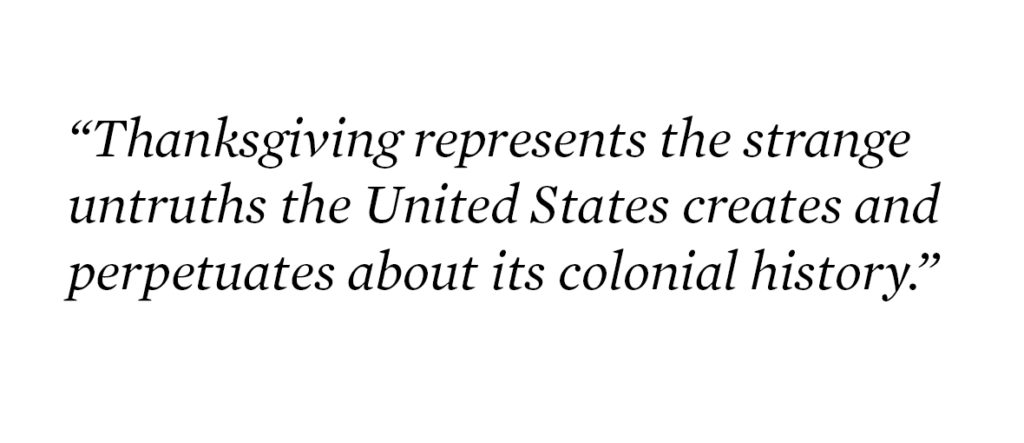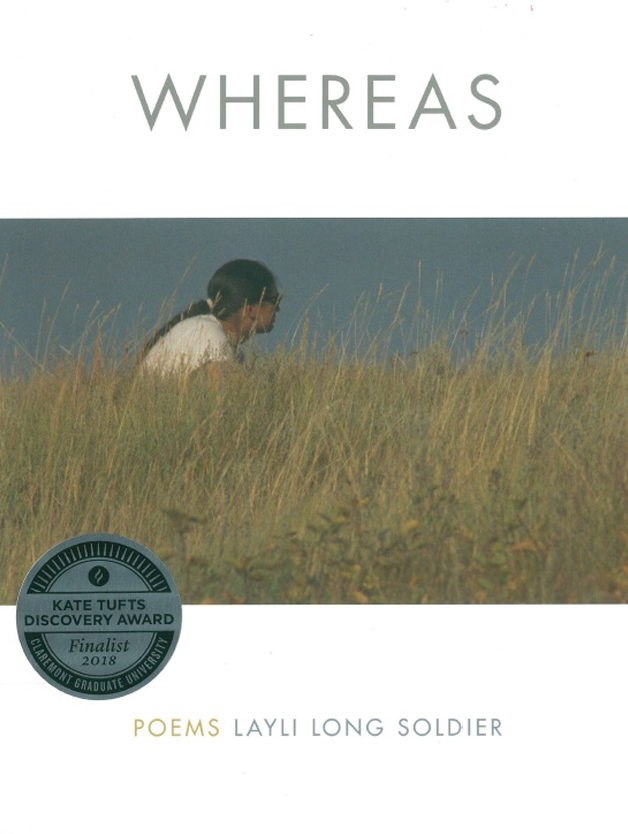A Pair of Thanksgiving Poems

For those of us in the United States, the last Thursday of November marks our day of Thanksgiving. For me, this week offered a short but welcome break for me from coursework, but also marks another reminder of the strange conditions in which we’re all living. This year, Thanksgiving didn’t mean eating a turkey or seeing my parents, but I thought I would use this blog to offer up a few poems and poets that are helping me mark the occasion.
Thanksgiving is a complicated holiday. As a celebration centered around eating and gratitude, it’s one of my favorite holidays. I love the chance to intentionally give thanks for my life and loved ones, and I really, really love pumpkin pie. Thanksgiving also, in many ways, represents the strange untruths the United States creates and perpetuates about its colonial history. Celebrating this day can and should offer an opportunity to consider these enduring myths and to seek language and narratives that may disrupt them. 2018 Kate Tufts Discovery finalist and member of the Oglala Lakota Nation, Layli Long Soldier’s debut book of poems Whereas offers such a counter-history to the dominant stories proliferated about settler/indigenous relationships and their enduring legacy.
The primary text to which Long Soldier responds in this book is a 2009 apology that the United States Congress issued to all indigenous persons and communities in the country. The resolution, which contains such confounding sentences such as: “Whereas Native Peoples and non-Native settlers engaged in numerous armed conflicts in which unfortunately, both took innocent lives, including those of women and children;” and concludes with “Disclaimer.—Nothing in this Joint Resolution—(1) authorizes or supports any claim against the United States; or (2) serves as a settlement of any claim against the United States;” was passed with little fanfare or any real consequence for indigenous peoples or communities currently living in the country.

Long Soldier’s text wrestles with the ambiguous meaning of the word “whereas”—which begins nearly every line of the apology—and extends the government’s language into the personal and collective lived experiences of Native North American peoples in contemporary society. Long Soldier’s poems offer lyrical details of the navigation between indigenous identities and histories in a country whose government so deftly uses language to deny, obscure or hide those peoples and histories. Excerpted from Whereas:
“Whereas sets the table. The cloth. The saltshakers and plates. Whereas calls me to the table because Whereas precedes and invites. I have come now. I’m seated across from a Whereas smile. Under pressure of formalities, I fidget I shake my legs. I’m not one for these smiles, Whereas I have spent my life in unholding. What do you mean by unholding? Whereas asks and since Whereas rarely asks, I am moved to respond, Whereas, I have learned to exist and exist without your formality, saltshakers, plates, cloth.”
You can listen to a recording of Long Soldier reading the title poem here and hear her read from and discuss Whereas on the Poetry Foundation’s Poetry Off the Shelf podcast.
Thanksgiving is also, of course, about food. A huge meal has to be prepared and consumed, and gives us the chance to all gather around a stove or table, busying our hands while we spend time as a family or in community. Running through the kitchen, sneaking bites while my mother and grandmother alternately assigned us tasks or shooed us outside, was generally how my cousins and I spent most of Thanksgiving day as children. Taking some time to cook and eat today, I hope that some of the ritual of the kitchen will help connect me to my parents and family in other states as safety concerns keep us from gathering together.
Current United States Poet Laureate and member of the Muskagee (Creek) Nation, Joy Harjo’s 1994 poem “Perhaps the World Ends Here” celebrates the life-affirming space of the kitchen and especially of the kitchen table: “The world begins at a kitchen table. No matter what, we must eat to live.” The table offers a place to be with personal, familial and communal histories, and to experience all the unique pleasures and pain, the comfort and conflict, that these gatherings elicit. Its a space to congregate, to create, to argue, to mourn, to seek refuge, tell stories, to mark endings and to begin again:
Wars have begun and ended at this table. It is a place to hide in the shadow of terror. A place to celebrate the terrible victory.
We have given birth on this table, and have prepared our parents for burial here.
At this table we sing with joy, with sorrow. We pray of suffering and remorse. We give thanks.
Perhaps the world will end at the kitchen table, while we are laughing and crying, eating of the last sweet bite.
Whether you spent the weekend with family, friends, or in isolation, I hope you ate something delicious and can join me gratitude for the words of these brilliant poets!
—Lilly Fisher
Share